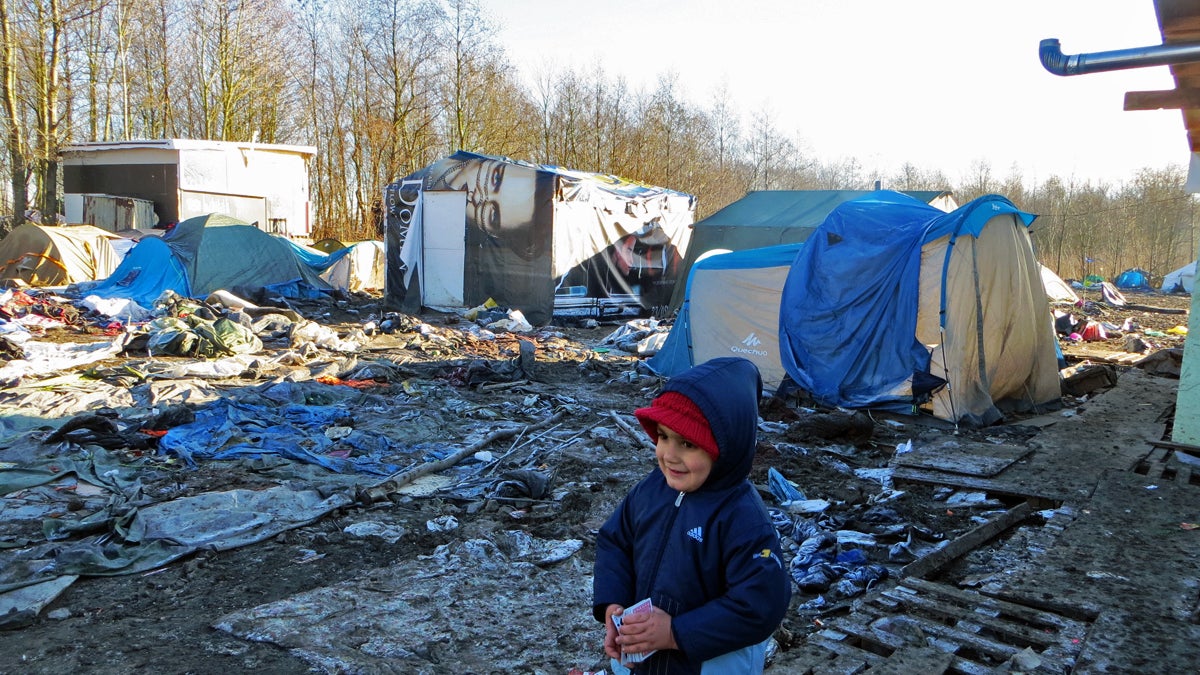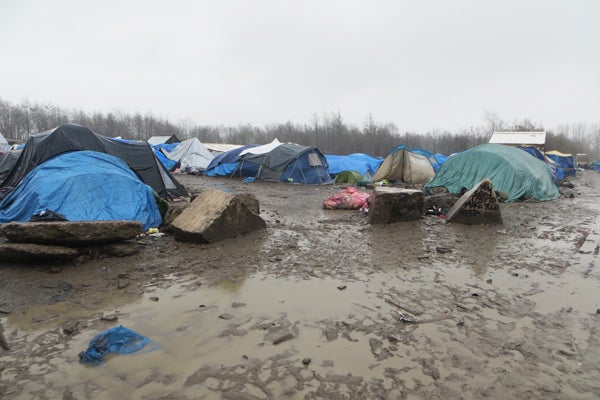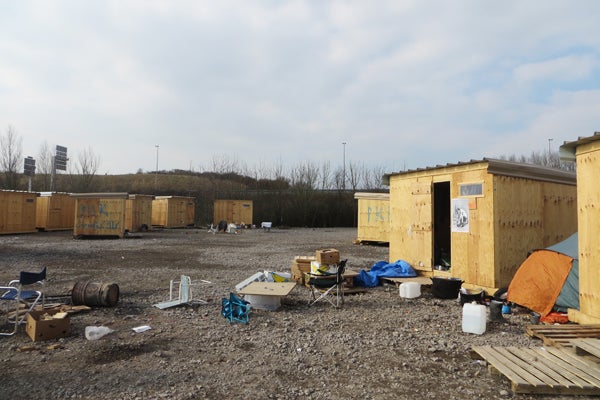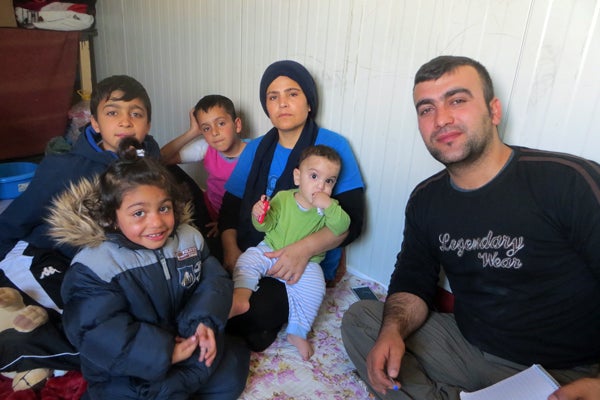Sick and tired: a look at the health of Europe’s new migrants
Listen
Mud isn't the only problem in the Basroch camp. There is also waste everywhere
In an attempt to flee the horrors of war in the Middle East, refugees like those in the Basroch neighborhood of Grande-Synthe, France are plagued by layers of diseases, injuries, and trauma.
More than a million refugees and migrants entered Europe in 2015. People continue to arrive on Europe’s shores every day in the worst refugee crisis the continent has seen since WWII. Many of these new arrivals had to undertake long, harrowing journeys in their search for a safe place. Many of them suffer physical and mental health consequences of their journey, as I learned when I visited a migrant camp in northern France.
Thousands of people are currently living in migrant camps in northern France. Just a thin strip of water separates this part of France from the British shore– which is where many migrants hope to make their homes. Refugees pay smugglers to sneak them across, or try to stow away on trucks or boats bound for the UK. But tough new border restrictions and increased security has made crossing almost impossible. This has created a refugee bottleneck in the area.
For years, migrants had been camping near the Basroch neighborhood in Grande-Synthe, a small suburb of the northern French town of Dunkirk. However, last year, the numbers swelled and conditions in the camp deteriorated. In January 2015, an official from medical charity Doctors Without Borders said the conditions there were “the worst she had seen in 20 years of humanitarian work.”
Mud, misery and coughs
When I arrived in the Basroch camp in February, rain was lashing down in torrents. The field where the tent city was located was flooded and the ground was nothing but mud, pools of water and piles of rubbish. On several different occasions, I stepped and sank into mud that rose high up on my calves.
All around me, shabby tents collapse into the mud and, occasionally, I get a glimpse of life within. It was hard to believe that people live here, but they do. At peak time, in January this year, more than 2,500 people were crowded into this tent city, waiting in the mud for a chance to get over the border to England.

In January, more than 2,500 people, mostly refugees from Iraqi Kurdistan, were living in this flooded tent city in the northern French town of Grande-Synthe. (Brenna Daldorph/for WHYY)
Doctors without Borders, known in France as Médicins Sans Frontières or MSF, is one of the medical charities that provides free health care in the Basroch migrant camp.
‘We have a huge proportion of higher and lower respiratory tract infections linked with these conditions,’ said Angelique Mueller, the project coordinator for MSF in Dunkirk.
She said she sees many children with colds and ear infections. Many people also have scabies, a nasty skin disease that is a result of unhygienic living conditions – the mud and dampness, and the fact that there are about 30 showers for the nearly 3,000 people.
Angelique also explains that people with long-term illnesses or medical conditions often run out of medicine on their journey. MSF doctors have prescribed medicine for epilepsy, hypertension, asthma and diabetes, to name a few.
“Though, I have to say that, for the most part, most of the migrants are young and strong,” she said. “They don’t arrive in bad physical condition. Their mental health is another topic entirely. They are very obviously traumatized”.
Mueller says a psychiatrist comes to the Basroch camp sometimes, but she isn’t in today.
Constuction underway
MSF works in humanitarian camps for refugees all over the world, from Syria to South Sudan. Yet even these hardcore MSF doctors– like Mueller– were appalled by the conditions here. That’s why the organization joined forces with the local mayor at the end of 2015 to construct a brand-new camp for these refugees. They decided to do it without funding from that national government because France is opposed to building permanent structures for the refugees since authorities are worried these facilities will attract more people.
But the mayor of Grande-Synthe and MSF couldn’t leave these people in the flooded tent city. This new camp is located less than a mile and a half away. It cost over three million euros to build, but it will be up to international humanitarian standards.
But on that rainy day that I find myself in the Basroch camp, completion of the new camp is still several weeks away. And keeps getting delayed. While it is being built, the people in the old camp just have to wait and wait in the rain and the mud.
I went to speak with the people waiting outside to see the MSF doctors in their portable doctor’s office. Shivering, pale patients gather under a tarp as rain drums down. There, I meet Shaima, a young mother from Iraqi Kurdistan. She lives in the most flooded part of the camp. Her 11-month-old son, Iwa, has had a fever for five days and his breathing is ragged.
The MSF doctor can’t diagnose Iwa’s illness, but she thinks it is urgent enough to send him to the hospital for tests. I try to find out what happened to them, but no one can tell me.
The new camp
I go back to Grande-Synthe a few weeks later to see the new camp, which was finally completed in March. The 2,500 people were moved over from the Basroch camp in three days.
The first thing I notice is that there’s no mud. A special kind of tarp was implanted in the ground to keep water from rising. The spring sun is shining on the dusty, brown earth. Kids play on bikes. One kid is wearing roller blades while riding a bike.

Residents of the new humanitarian camp in Grande-Synthe, France, live in small, unfurnished huts. (Brenna Daldorph/for WHYY)
For as far as I can see, there are rows and rows of little wooden huts. They are unfurnished, one-room buildings. Some families have already added wonky additions out of tarp. Colorful laundry flaps in the wind. There are shower blocks and toilet facilities.
In the nightmare that was the old Basroch camp, all anyone could think about were the most immediate health concerns. The cold, the flooded tents and soaked clothes, the respiratory infections, the scabies. At the new camp, I start to see other injuries, many related to the journey they’ve undergone.
A highway runs by the camp and people still try every night to jump on a truck bound for England. I speak to one man whose wife fell off a moving truck, and hurt her back. Volunteers point out another man in a cast who shattered his leg in the same way. I see another man on crutches. He was injured playing football, but it means he’s trapped in the camp for the foreseeable future.
Another person who can’t make the crossing is Faris. He’s 21, a Bedoin from Kuwait. Faris is young and healthy, but his mom isn’t. She had an asthma attack when running away from police in Greece. The bad diet on the journey gave her stomach problems. She suffers from both rheumatism and anemia. They’ve visited three hospitals since leaving their home and Faris is too afraid to try and get on a truck with her.
One family’s story
Jumping on a moving truck is also unthinkable for Zhyan and Sabah, a Kurdish Iraqi couple. They have four children, the youngest of whom is only six months old.
Zhyan invites me into their hut. There’s no furniture in the hut besides some folding chairs. They sleep on blankets piled on the floor.

This family fled the advances of the Islamic State group in northern Iraq. They are now living in a humanitarian camp in northern France. (Brenna Daldorph/for WHYY)
Her seven-year-old son Shkar shows me his bandaged shoulder. The children tell me the story with smiles and animation, but their injuries look painful. Burns from fires and heaters are one of the most common injuries in both the old and new camps. During my last visit to the Basroch camp, an MSF doctor told me they were treating 10 burns a day. Zhyan shows me burns on her arm, as well.
This family fled the Islamic State group, which was advancing on their hometown of Kirkuk, in northern Iraq. They traveled through eight countries to get here. They tell me about spending freezing nights outside, with the baby and toddler. Both parents cry remembering it.
When Sabah shows me photos on his phone of the kids wearing life jackets on the boat from Turkey to Greece, Zhyan gets my attention. She doesn’t speak English, but she wants to make me understand something. She points to her kids. “Aylan,” she says, shivering.
Aylan is the name of the tiny, baby boy photographed dead on the beaches of Turkey. His family was fleeing from Syria and he drowned when the flimsy boat his family was in capsized. Zhyan points to each of her kids and repeats it. Aylan. With haunted eyes, she’s saying: “that could have been my child.”
Sabah and Zhyan left Iraq to save their children from bombs and the terror of war. But they tell me they feel guilty for putting their kids through all this fear and confusion. Now, the family is trapped in a drafty hut in northern France, unsure of where to go or what to do. And that’s what makes them sickest of all.
WHYY is your source for fact-based, in-depth journalism and information. As a nonprofit organization, we rely on financial support from readers like you. Please give today.



